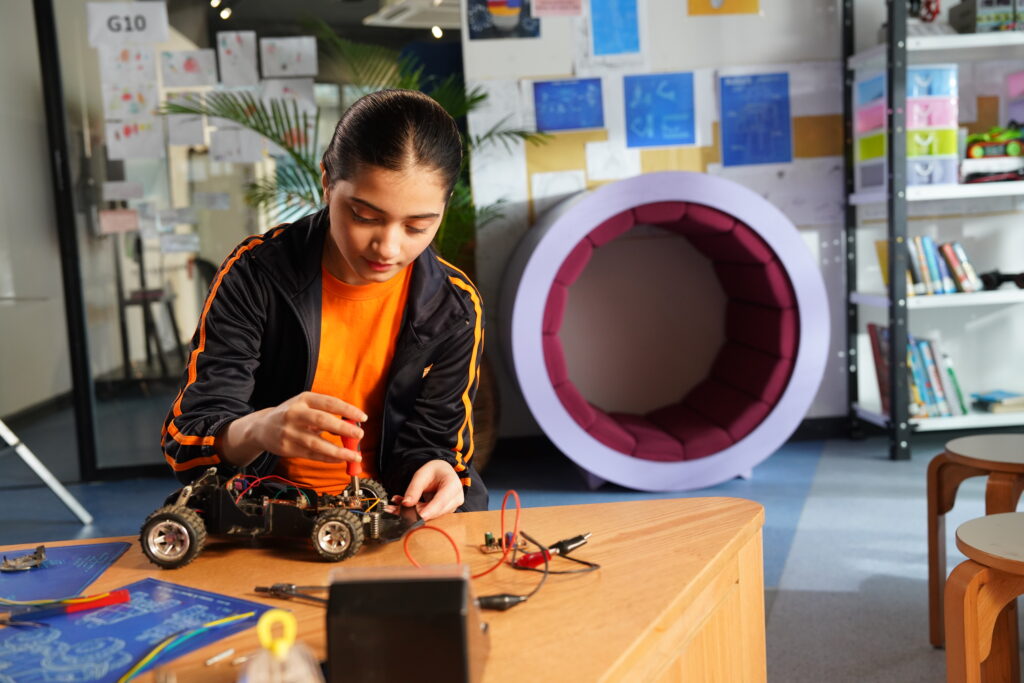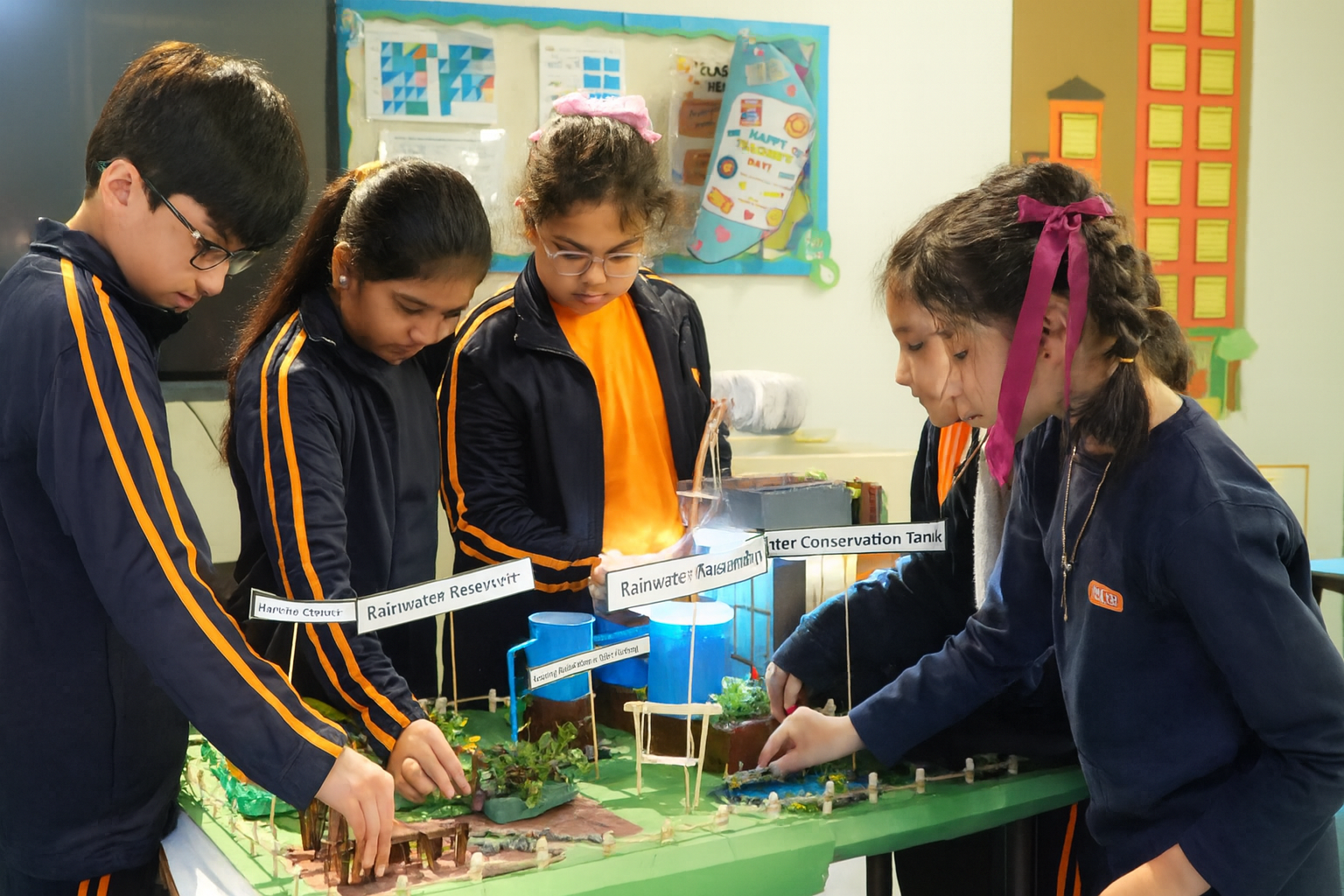Curricula
THE REGGIO
EMILIA APPROACH
TNS Beaconhouse was the first school in Pakistan to introduce the Reggio Emilia Approach and it is the overarching philosophy that guides our project-based learning and International Baccalaureate Programme.
The Reggio Emilia Approach is a holistic philosophy to both teaching and learning, based on the principle of learning by doing where children must be facilitated in exploring their world through a certain level of control over the direction of their learning. The arts are viewed as a means of expression for children and integrated as a learning tool for their overall development and understanding of their experiences.
Great emphasis is placed on the interrelationship between parents, teachers, and the immediate environment. They work together for a common purpose – to create a learning culture that respects every child as a thinking and competent individual, capable of participating in his or her own learning not just at school but also at home.
The child’s physical environment, often called the “third teacher,” holds significant importance in Reggio Emilia. Carefully structured, it becomes a valuable source of learning with settings that offer opportunities, encourage exploration, communication, and the formation of relationships. Within this environment, cooperation and healthy debate thrive, nurturing essential skills and social development.



PROJECT-BASED
LEARNING
At TNS Beaconhouse we believe that children learn best when they are left to explore and discover, encouraged to ask questions and seek answers through guided inquiry. Project-Based Learning (PBL) builds on problem-solving, communication, questioning, student interaction and most importantly their natural curiosity, putting students at the helm of the learning process. It engages and sustains their interest, ensuring a deeper understanding of concepts. So, instead of learning a set of predetermined and contextualised information, students will acquire knowledge and skills that build upon their own experiences. PBL extends beyond the classroom to every student’s home, community, nation and eventually the world.
The approach also ties in well with the overarching philosophy of Reggio Emilia and the shared principles of learning by doing. PBL maintains the balance for students to understand and learn real life skills which create the basis for their preparation for a rigorous IB programme.
INTERNATIONAL MEMBERSHIPS & ACCREDITATIONS

TNS Beaconhouse is an IB World School, authorized by the International Baccalaureate Organization to offer its various programmes. This status is given to schools that adhere to the rigorous standards and philosophies set by the IB.
Such a system is ideally suited to students who have been engaged in Project-Based Learning as it emphasizes critical thinking, global perspectives, and a commitment to making a positive impact on society. As an IB World School, TNS Beaconhouse encourages inquiry, reflection, and an understanding of different cultures, helping students become responsible, empathetic, and well-rounded global citizens.
The MYP prepares students for the rigor and independence of the Diploma Program (DP). Its focus on research, reflection, and interdisciplinary thinking equips students for Extended Essays, Theory of Knowledge (TOK), and internal assessments in the DP.
TNS Beaconhouse provides students with a pathway to earn a dual diploma upon graduation. Students who meet the set academic and credit requirements successfully complete both the American High School Diploma and the International Baccalaureate Diploma Program (IBDP). This dual qualification equips graduates with credentials recognized by universities both locally and internationally.

Both TNS Beaconhouse DHA and Gulberg campuses are authorized to offer the International Baccalaureate Middle Years Programme (IBMYP). The IBMYP is a natural progression for the project-based approach since the very early years at TNS Beaconhouse. It provides a framework of academic challenges for students from 11 to 16 years of age (classes 6 – 10). These academic challenges, rooted in progressive educational thinking, encourage students to embrace and understand the connections between theory and practice.
The curriculum emphasizes inquiry and conceptual learning, where learning is driven by questions, reflection, and real-world application through deep conceptual understanding.
Through Approaches to Learning (ATLs), students build thinking, research, communication, self-management, and social skills across subjects, empowering them to become independent and reflective learners.
Learning is further grounded in global contexts, with six key themes that give meaning and relevance to classroom experiences: Identities and Relationships, Orientation in Space and Time, Personal and Cultural Expression, Scientific and Technical Innovation, Globalization and Sustainability, and Fairness and Development.
Assessment:
Assessment in MYP & is criterion-related, therefore students around the world are measured against pre-specified criteria for each subject group. Teachers may modify these criteria to be age-appropriate in the earlier years of the programme. Teachers set assessment tasks that are assessed internally in the school. In the final year of the MYP (typically MYP Year 5), students complete external assessments: exams, portfolios, and on-screen tasks moderated by the IB. Students who complete eAssessments are eligible for MYP Course Results and potentially the IB MYP Certificate.

- Study six subjects chosen from the six subject groups
- Complete an Extended Essay
- Participate in a Theory of Knowledge course (TOK)
- Participate in Creativity, Action, Service (CAS)
Further information about the International Baccalaureate is available on its website www.ibo.org.
MIDDLE STATES ASSOCIATION OF COLLEGES AND SCHOOLS
TNS Beaconhouse also holds Accreditation by MSA CESS, a worldwide leader in accreditation and school improvement.
For more information visit msa-cess.org/
AHS DIPLOMA
The American High School Diploma is the basic US qualification awarded to students who graduate from secondary school after 12 years of formal instruction. High school diplomas are issued by the school to graduates. The American high school secondary education is divided into two phases:
Middle School: 6th to 8th Grade
High School: 9th to 12th Grade
Curriculum
The School will set a minimum requirement for how many years of various mandatory subjects are required in order to be awarded the American High School Diploma. These requirements include completion of 3-4 years of each of the common core subject groups over Grade 9 to Grade 12.
IBCC EQUIVALENCE
The IBCC recognizes the MYP and DP/CP as equivalent to Pakistan’s SSC/HSSC under updated conversion policies.
Certain MYP subjects (Urdu eAssessment, Integrated Humanities, Interdisciplinary Learning) fulfill local requirements.
The IBCC also recognizes the American High School Diploma track, for which equivalence is granted based on core subjects and local requirements (Urdu, Islamiyat, Pakistan Studies).

